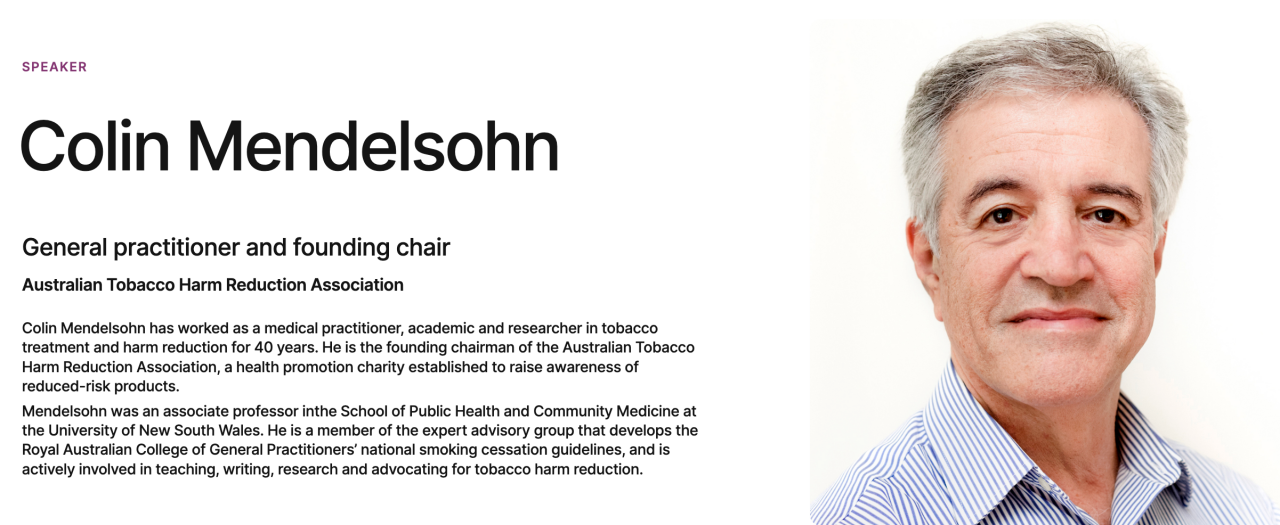On September 21st, during the 2023 Global Tobacco and Nicotine Forum (GTNF2023), Dr. Colin Mendelsohn, an Australian smoking cessation expert, shared his views and recommendations regarding the current state of e-cigarette regulation in Australia and the future use of harm reduction products worldwide in an exclusive interview with 2FIRSTS.

Dr. Colin Mendelsohn is the founding chairman of the Australian Tobacco Harm Reduction Association, a health promotion charity established by doctors to raise awareness about reduced risk alternatives to combustible tobacco. With over 40 years of experience in the fields of tobacco treatment and harm reduction, he previously served as an Associate Professor in the School of Public Health and Community Medicine at the University of New South Wales. Dr. Mendelsohn is also a member of the expert advisory group that developed the Royal Australian College of General Practitioners' National Smoking Cessation Guidelines. He is actively involved in teaching, writing, research, and advocacy to reduce tobacco harm.

Dr. Mendelsohn pointed out that while Australia has historically been a global leader in tobacco control, the country has recently fallen way behind in the fight against smoking.
"In the past, we were early adopters of plain packaging, high tobacco taxes, bans on tobacco advertising, smoke-free policies, and large-scale media campaigns. However, over the last ten years, it seems we've taken our eye off the ball, and as a result, our smoking rates have remained stagnant for four to five years," he stated.
Australia has increasingly relied on raising tobacco taxes, resulting in a five-fold increase in tobacco excise over the past fifteen years placing significant financial strain on low-income smokers. Australia has the highest priced cigarettes in the world. This approach has also inadvertently fueled a thriving black market for illegal tobacco products which now amounts to 20-25% of the total tobacco supply. Modelling has shown that the country will fall way short of its target to reduce adult smoking rates to 10% by 2030.
"I believe Australian Tobacco Control has failed to provide the strategies needed to contain the tobacco epidemic. We've focused solely on abstinence. However ther are many smokers in Australia who are simply unable to quit and who could benefit from harm reduction options that haven't been promoted and are difficult or illegal to access," he emphasized.
Regarding the regulation of e-cigarettes in Australia, which shifted to a prescription system on October 1, 2021, Dr. Mendelsohn described it as a resounding failure. He highlighted the challenges in the system. Smokers are required to find doctors willing to prescribe e-cigarettes, and then pharmacists willing to dispense them—and very few are willing to provide this service. Consequently, less than 10% of adult vapers possess a nicotine prescription, leading the majority of Australia’s 1.3 million adult vapers to access these products through the black market.
"We have a thriving black market selling unregulated vaping products to both adults and young people. This has resulted in a significant problem with youth vaping, and it's all due to this policy. The black market has seen massive growth and is operated by criminal networks," Dr. Mendelsohn emphasized.
Despite the evident shortcomings of the prescription model, Dr. Mendelsohn lamented that the Australian Health Minister has decided to reinforce this approach, doubling down on a failing system. Dr. Mendelsohn praised New Zealand and the UK for their regulatory approaches to e-cigarettes.
"With government support and encouragement, I believe there is a tremendous opportunity to reduce smoking rates," he added.
Regarding the future development of harm reduction products globally, Dr. Mendelsohn emphasized the need for policy to be evidence-based. He noted that there is now strong evidence that access to high-quality safer products can save lives, but many regulations are driven by fear and misinformation.
"We should have a full range of safer alternatives for smokers, including vapor products, heated tobacco snus and nicotine pouches, as different products work for different people. Addressing youth use and environmental concerns, especially for disposable products, are crucial. There's a massive opportunity here for public health, and if we do it properly, we'll save millions of lives," Dr. Mendelsohn stated.
In conclusion, Dr. Mendelsohn underscored the comprehensive support the prescription model has received from political parties, public health groups, health charities, medical associations, and health authorities in Australia. He expressed concern that it may take further evidence of further failure before these stakeholders consider rational policy changes, and in the meantime, lives are being lost, which he views as a preventable tragedy.


